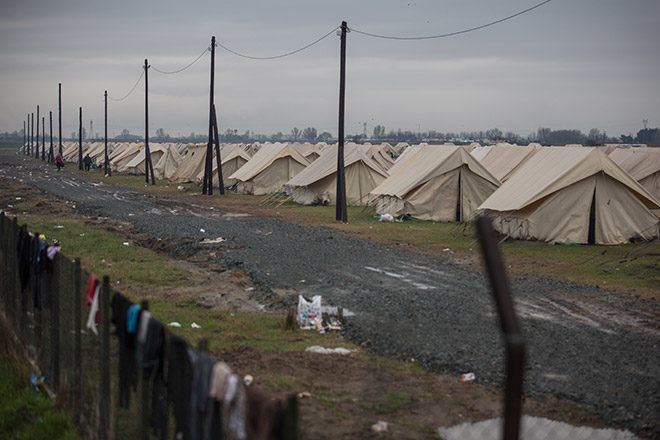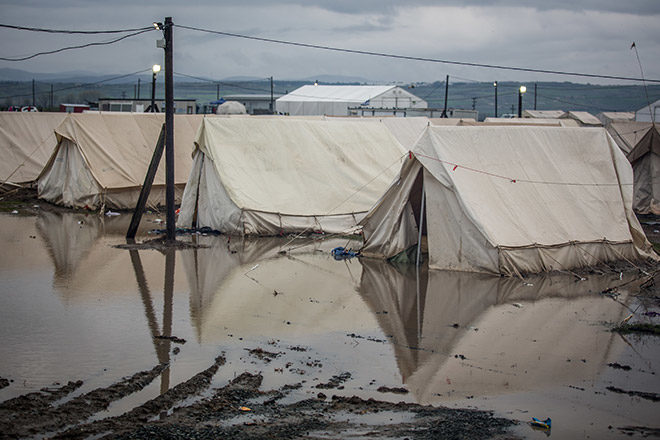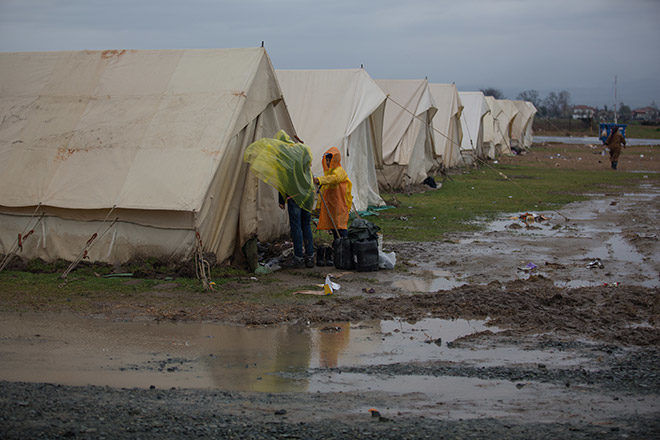News
The humanitarian crisis in Greece threatens to escalate

Since the route through the Balkans has, in effect, been closed, thousands of migrants have become stuck in Greece. The humanitarian crisis is intensifying – with unforeseeable consequences. Salinia Stroux und Chrissi Wilkens, members of PRO ASYL’s project RSPA, have sent this report.
At the closed Greek-Macedonian border, thousands of people are camping in the most miserable conditions. Time and again refugees risk their lives by attempting to move onwards to Central Europe. “Why aren’t they just going back?” the cynics ask, implying that this would even be an option for the refugees in Idomeni. And yet the conditions in the Greek camps where the refugees are supposed to be placed are hardly different to those in the barbed-wired misery of Idomeni. Desperate and without shelter, the refugees’ situation has been extremely precarious for years, and the closing of the route through the Balkans, forced through by Austria and implemented by Macedonia, has only served to escalate the situation. Thousands of refugees are in danger of becoming trapped in Greece.
Thousands are already without shelter
According to current estimates, more than 27,000 refugees are stuck in some 18 locations in Greece. As a result of the closure of Greece’s border with Macedonia, the government in Athens expects that more than 100,000 migrants could get stuck in Greece in the next few days. In an attempt to regulate the distribution of migrants on the islands and the mainland, it has chartered special ferries. But even after the trip from the Aegean Islands to Piraeus or Kavala, thousands camp in the open air – in the harbour, or along the motorway and in the centre of Athens.
Others attempt to walk hundreds of miles to reach the Greek-Macedonian border, with them are people in wheelchairs, newly-borns, and old people carried on their children’s shoulders. “In Idomeni, in Athens and other parts of the country people camp out in the open air, without access to essential services. The situation is getting worse by the day,” Marie Elisabeth Ingres, head of Médecins Sans Frontières in Greece, reported to RSPA.
In the past few days, local residents and authorities have attempted to feed hundreds of migrants. Without this, the situation would be far more dramatic. On the islands, in Athens and in Idomeni, volunteers work around the clock in soup kitchens, feeding up to 5,000 people at a time. All food supplies come from donations. But not everywhere do the local residents show solidarity with the migrants. On February 28, there were two arson attacks on two planned refugee camps in northern Greece.
Military camps for refugees all over Greece
The government attempts to alleviate this dramatic crisis by opening new transit camps. On the one hand it is about new “hot spots”. In addition to the five hot spots in the Aegean Islands, a further five are planned for the northern regions of Kilkis and Giannitsa. On the other hand, so-called “relocation camps” are being established in Diavata, Schisto, Elaionas and Elliniko. These are huge camps, usually installed in former barracks by the military and surrounded by barbed wire.

Already the existing camps – in campsites, port depots, Olympic stadiums and container depots – are all overcrowded. Many refugees are afraid that the military-run mass camps may be turned into prisons. Last week, refugees in the newly established camp in Diavata near Thessaloniki tore down fences and set off on foot towards Idomeni. Since last Monday, journalists no longer have access to the camps. Greece is in a state of emergency.
Public spaces in Athens are turned into tent cities
On Athens’ Victoria Square, which for some years now has been a meeting place for refugees exchanging information and planning their onward travel, the atmosphere has been tense since last week. Families and their babies are lying on filthy blankets on the cement floor. People are begging for food and water, while NGO workers run around desperately. “Bread, water, milk and blankets. That’s the only help we can give them. What else can we do?” says one of them.
Many refugees have spent the past few nights here with their children. There is no more space for them in the refugee camps or other provisional reception structures. Refugees and aid workers report catastrophic and unacceptable conditions: hunger, thirst and rotten food supplied by the military. “Every day Victoria Square is filling up afresh,” says Mubarak Shah, member of RSPA. “There are not only Afghanis here, but also Syrians, Iraqis, Iranians and refugees of other nationalities. They’re all hoping that the borders will open again soon. Local residents and shop owners are getting worked up, and we are worried that very soon we might see further racist assaults.”
The government tries to set up more emergency shelters in places such as parks and other smaller settings. However, because of systematic failings at the admittance and integration stages, most refugees do not want to remain in a crisis-shaken country where the unemployment rate is currently higher than 24%. They leave the mass camps where they have been placed – some on foot – and go either back towards the border, or to Athens, where they try to organise their onward journeys.

The human trafficking business is booming due to closed borders
The human trafficking business in Athens’ centre has just reached a new high point. By now, migrants pay between 3,000 and 4,000 Euros to be taken across the border, either through Albania’s mountains or by boat from Western Greece to Italy. Just a few days ago, when the border was still open for Afghani refugees, the price was as low as 2,500 – 3,000 Euros. But with increasing demand prices have shot up. The political decision to shut the route through the Balkans will force ever more refugees to seek out illegal and hence riskier and more expensive routes to Central Europe.
A drastic escalation of the humanitarian crisis is expected
Supporters and human rights organisations in Greece are alarmed. “If the border with Macedonia isn’t opened for Afghanis very soon, Greece’s capacity to receive migrants will be exhausted within eight days,” a spokesperson from MSF warned as early as February 23. Among the migrants stuck in Greece there are many families, children and minors.
»We’re fed up with travelling on illegal routes and risking our lives. I myself have seen five dead bodies on my journey from Kabul to Athens.«
The situation could soon escalate again. It is estimated that on average 2,000 refugees reach the Greek coast every day, mostly in unseaworthy dinghies and fishing boats. Since the beginning of the year, more than 120,000 refugees have arrived in Greece, almost two thirds of whom are women and children.
Those fleeing war cannot be stopped by fences
Back on Victoria Square, Maria Galinou, a member of the International Salvation Army, is trying to organise medical assistance for an Afghani girl who has contracted pneumonia during the crossing through the Aegean Sea. Regarding the tightening of the border controls she says: “Irrespective of how many hurdles are put in people’s ways, they will find other, more dangerous, routes to safety.”
A few metres away, a young man called M. is sitting under a tree together with several Afghani families. They have spread blankets on the ground and have tried to create some shelter from the rain by hanging cut-up plastic bags in the tree’s branches. They have been sleeping here for more than four days. Every day the 23-year-old Afghani man tries to get information on the situation at the border. He wants to get to Germany, but without the help of traffickers. “I don’t have money for that, and apart from that, we’re fed up with travelling on illegal routes and risking our lives. I myself have seen five dead bodies on my journey from Kabul to Athens. We want legal routes created for us.”